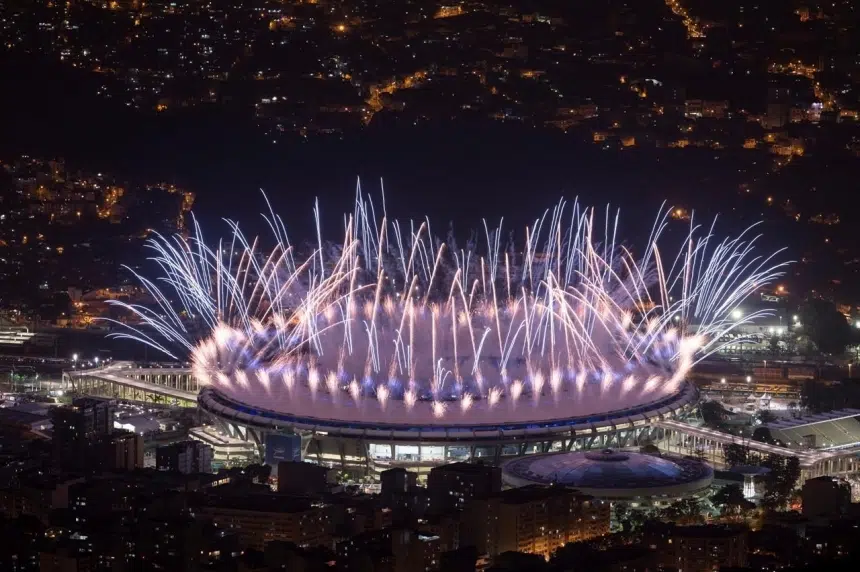RIO DE JANEIRO — With fireworks forming the word “Rio” in the sky, performers decked in silver and sweet, sultry music, Rio de Janiero is welcoming the world to the first Olympic Games in South America with a message: Let’s take better care of our planet.
After one of the roughest-ever rides from vote to games by an Olympic host, the city of beaches, carnival, grinding poverty and sun-kissed wealth lifted the curtain on the games of the 31st Olympiad with a three-hour gala that celebrated Brazil’s can-do spirit, biodiversity and its indigenous people. It will trace its history from forested land, through colonization by Portugal, and into a nation of astounding diversity and contrasts.
Before the show, in a video broadcast inside the 78,000-seat Maracana Stadium, U.N. Secretary-General Ban Ki-moon said the games “celebrate the best of humanity” and appealed for an Olympic truce, calling on “all warring parties to lay down their weapons” during the two weeks of sporting achievement.
Performers decked in silvery suits folded and unfolded glittering silver sheets that transformed into giant cushions they then beat like drums. Fireworks lit up the skies and the peace symbol, tweaked into the shape of a tree, was projected on the floor of the stadium where Germany won the World Cup in 2014.
As well as a showcase for Brazil’s history, culture, diversity and hopes, the gala also represents a triumph, because there were times after the International Olympic Committee selected Rio ahead of Chicago, Tokyo and Madrid in 2009 when it seemed that the city of 6.5 million people might not get its act together for the world’s greatest sporting mega-event.
But with more than a dash of “gambiarra,” the Brazilian art of quick-fixes and making do, Rio de Janeiro is ready.
Just.
The honour of declaring the games open will fall to Michel Temer, Brazil’s unpopular interim president, standing in for suspended President Dilma Rousseff. Her ouster less than four months out from the games for alleged budget violations was one of the many complications that roiled Brazil’s Olympic preparations and impacted the opening ceremony itself. Fewer than 25 foreign heads of state were expected, with others seemingly staying away to avoid giving the impression of taking sides amid Brazil’s leadership uncertainty.
As Brazilian officials took their places, there were shouts of “out with Temer” from sections of the crowd.
Athletes from 205 nations and territories were marching behind their flags, joined by a first-ever Refugee Olympic Team of 10 athletes, displaced from Syria, South Sudan, Congo and Ethiopia. Their flag-bearer, Rose Nathike Lokonyen, fled war in South Sudan and ran her first race in a refugee camp in northern Kenya.
Rosie MacLennan, Canada’s flag-bearer and its only gold medallist from the 2012 London Olympics, wore a wide grin as she waved the Maple Leaf.
Behind her, the team looked smart in red jackets emblazoned with giant white Maple Leaf symbols on the back.
Prime Minister Justin Trudeau was not present at Maracana Stadium. Canada was represented by Governor General David Johnston.
“On behalf of all Canadians, I extend my heartfelt gratitude and appreciation to our athletes who have displayed such tremendous dedication and commitment,” Trudeau wrote in a statement.
“They motivate us — especially our young people — to be more active in sport, whether it is in our own backyards, in local parks, or in sport venues from coast to coast to coast. We are very proud of each and every one of them, and confident that they will be excellent ambassadors of Canada’s culture, athleticism, and values.”
Michael Phelps led the U.S. team, the largest with 549 competitors. History’s greatest Olympian will be looking to add to his record haul of 22 medals, in three individual swims plus relays, before the Aug. 21 closing ceremony.
On behalf of all 11,288 competitors (6,182 men; 5,106 women), a Brazilian athlete will pledge an oath that they won’t take banned drugs — a promise likely to ring false to many fans after the scandal of government-orchestrated cheating in Russia.
While it escaped a blanket ban, Russia is paying the price in the shape of a smaller team, whittled down from a 389 athletes to around 270.
Iran picked a woman, archer Zahra Nemati, as flag-bearer for its team made up overwhelmingly of men.
After the grandeur of Beijing’s opening ceremony in 2008 and the high-tech, cheeky inventiveness of London’s in 2012, Rio’s was expected to be more earthy, with funk, samba and joie de vivre laced with more serious messages from the country with the world’s largest forest, the Amazon, for the need to protect the planet. Grammy award winners Caetano Veloso and Gilberto Gil, and supermodel Gisele Bundchen were expected to star.
“The world is very tense and so is Brazil. We are also willing to tell the world to stop attacking our home. The world is threatened because of global warming. We are calling for action,” said Fernando Meirelles, one of the directors of the show.
After Brazil’s most famous athlete — soccer star Pele — said he will not appear, the Olympic mystery of who might light the cauldron remained intact.
The cauldron was designed by American sculptor Anthony Howe, who told The Associated Press he was inspired by life in the tropics. There will be two cauldrons in Rio, one at the Maracana soccer stadium that is hosting the opening ceremony and another open to the public in downtown Rio.
The cauldron in central Rio is expected to be lit by a runner after the opening ceremony is finished, Howe said.
In all, 4,800 performers and volunteers will be involved in the show designed to showcase Brazil as a garden of the world.
“Smile is the approach the Brazilians have toward life,” said Marco Balich, the executive producer. “Brazil is not a grand nation. They’re saying in this ceremony, we are who we are, with a lot of social problems, a lot of crises in the political system, etc.”
NBC will broadcast the opening ceremony on a one-hour tape delay because it wants the entertainment spectacle to be shown completely in U.S. prime time. Rio is one hour later than Eastern time.
Mauricio Savarese And John Leicester, The Associated Press
©2016 The Canadian Press







